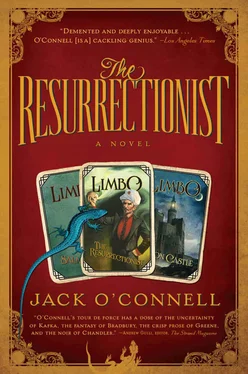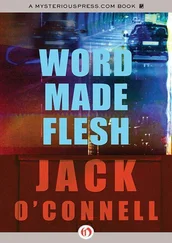Jack O'Connell - The Resurrectionist
Здесь есть возможность читать онлайн «Jack O'Connell - The Resurrectionist» весь текст электронной книги совершенно бесплатно (целиком полную версию без сокращений). В некоторых случаях можно слушать аудио, скачать через торрент в формате fb2 и присутствует краткое содержание. Год выпуска: 2009, Издательство: Algonquin Books, Жанр: Современная проза, на английском языке. Описание произведения, (предисловие) а так же отзывы посетителей доступны на портале библиотеки ЛибКат.
- Название:The Resurrectionist
- Автор:
- Издательство:Algonquin Books
- Жанр:
- Год:2009
- ISBN:нет данных
- Рейтинг книги:4 / 5. Голосов: 1
-
Избранное:Добавить в избранное
- Отзывы:
-
Ваша оценка:
- 80
- 1
- 2
- 3
- 4
- 5
The Resurrectionist: краткое содержание, описание и аннотация
Предлагаем к чтению аннотацию, описание, краткое содержание или предисловие (зависит от того, что написал сам автор книги «The Resurrectionist»). Если вы не нашли необходимую информацию о книге — напишите в комментариях, мы постараемся отыскать её.
those who create them and those who consume them. About the nature of consciousness and the power of the unknown. And, ultimately, about forgiveness and the depth of our need to extend it and receive it.
The Resurrectionist — читать онлайн бесплатно полную книгу (весь текст) целиком
Ниже представлен текст книги, разбитый по страницам. Система сохранения места последней прочитанной страницы, позволяет с удобством читать онлайн бесплатно книгу «The Resurrectionist», без необходимости каждый раз заново искать на чём Вы остановились. Поставьте закладку, и сможете в любой момент перейти на страницу, на которой закончили чтение.
Интервал:
Закладка:
Sweeney sat on the grass, catching his breath and studying the doors. Danny sat next to him, imitating his father’s pose and demeanor.
“They’re not locked,” Danny said.
Sweeney looked from the doors down to his son. The feathers seemed less strange now. But the mouth appeared even more beaklike, harder and more protruding.
“Have you been here before, Danny?”
The boy looked down in his lap and nodded.
“What am I going to find inside, son?”
Danny looked up and said, “Everything’s going to be all right, Dad.” But the voice and the tone and the body language gave it away as a lie.
“If I go inside,” Sweeney asked, “will I wake up again?”
Now Danny looked genuinely confused.
“I don’t get it,” he said.
“I’m asking you,” Sweeney said, “if the dream will end.”
Danny shook his head and said, “This isn’t a dream, Dad.” Then he stood up suddenly, extended his hand to his father, and said, “I’ll show you.”
They walked up the path to the doors, which parted as they approached. Candles mounted in holders high on the walls lit the interior foyer. Father and son stepped inside and Sweeney took a moment to let his eyes adjust.
It was partly the Peck Clinic. It was partly the St. Joseph in Cleveland. And there were touches of the old house back home — an endtable that had been in their bedroom, the framed print that Kerry had bought on a trip to San Francisco. But mostly the castle was Dr. Fliess’s Gothic laboratory, straight from the pages of Limbo.
In a corner of the foyer was an ornate, oversized grandfather clock, the same piece Sweeney had seen in the Peck residence. As soon as he looked at its face, the clock began to chime. And as soon as it chimed, as if it were a signal of some kind, Danny broke away from his father and sprinted up the center staircase to the second floor.
Sweeney yelled after the boy and started to run, but stopped when he heard his name called. He stood still, listened and heard it again, and followed the call into a parlor to the right of the stairs. The room was high Victorian, enormous but crowded with dark and heavy furnishings. Two wing chairs were positioned before a fireplace where a pile of logs was blazing. Someone was sitting in the nearest chair. He heard a crisp page being turned, smelled the cigarette smoke, and walked across the room to sit in the empty chair.
Nora Blake didn’t look up but she held out the hand that braced her cigarette to indicate she’d be with him in a minute. He looked up at the painting hanging above the mantel — a depiction of the Limbo freaks done in the same somber style of the Peck ancestral portraits. Danny was the centerpiece of the work. The rest of the troupe was fanned behind him.
Nora closed the book, sighed, and heaved it into the fire. Embers flew and she shook her head, plugged the cigarette into her mouth, and sucked until her cheeks caved in.
Sweeney looked at the book as the flames consumed its title— The Diary of a Young Chicken Boy.
He said, “You didn’t like it.”
“I’m done with fiction,” Nora said.
“Was it a pirate book?” Sweeney asked.
Nora shook her head, knocked some ashes onto the carpet.
“A love story,” she said and he knew it was a lie. “Really frivolous. I just don’t have the time or the patience anymore.”
She blew out a stream of smoke, came forward, slapped his bad knee, and said, “So you finally made it. What the hell took you so long?”
“You were expecting me?”
“I was hoping,” Nora said.
“To tell you the truth,” Sweeney said. “I didn’t have much say in the matter.”
Nora gave him a sour look and made a dismissive sound, blew some air through pursed lips.
“Of course you did,” she said. “Everyone has a choice. That’s all you’ve got. Choices up the wazoo.”
Sweeney didn’t want to argue with her. “What is this place?” he asked.
“Didn’t Danny tell you?” she said. “It’s home.”
“This isn’t my home,” he said. “I’ve never lived in a place like this.”
“Sweeney, honey,” Nora said, “your memory isn’t what it used to be.”
“I don’t think I can stay here, Nora.”
“You think too much, mister. I’d say that’s your number one problem. You overthink everything. My Ernie had the same tendency, by the way.”
“I’ve got bigger problems than that, Nora.”
She closed her eyes, shook her head.
“I knew you’d say that, Sweeney. I really did. I’m sorry but you’re as predictable as one of my romances.” She leaned forward again and knocked her paperback deeper into the flames. In a lower voice, she added, “It drove Kerry nuts you know.”
“You didn’t know Kerry,” he said and immediately regretted it. He realized that she was baiting him but couldn’t stop himself from giving her what she wanted.
“Let me tell you something about Kerry,” Nora said, angry now. “Kerry deserved better. Kerry deserved to be forgiven.”
“I did forgive her,” yelling now, “I swear to you I did.”
Nora wouldn’t look at him. She was staring at the fire. She said, “That’s right, swear to me.” And then she didn’t say anything else.
He waited a few minutes, watched the last of the paperback turn black and crumple into ash. Then he stood and said, “I have to find Danny.”
Nora rummaged in the chair cushion until she found her cigarettes. And Sweeney moved up to the second floor of the castle.
THE STAIRS WEREgrand-hotel wide but much too steep. Sweeney had to concentrate to be sure of his footing. It was as if each ledge had been fashioned into different heights. There was no way to gain a rhythm and run to the landing.
When he reached the top, he stopped by the railing that formed a balcony over the foyer. He was dizzy and so winded that he wondered about the altitude. He looked down over the banister and was hit with a wave of vertigo. Turning around, he went down on his bad knee and let out a yell. It echoed a bit down the three corridors that stretched off the landing and ignited a distant burst of laughter.
The laughter seemed to come from the left, so he moved in that direction and suppressed the urge to call out for Danny. The corridor was tall but narrow, like the halls of the Clinic. The floor was marble, covered by a green runner. The walls were covered in wainscoting, but they were lined with mounted torches that threw shadows and left large pockets of darkness.
He found them in the billiard room. They were at the far end, beyond the tables, which were covered in animal skins — cow and leopard and zebra hides. He stood in the doorway for a while. Romeo, the janitor, saw him first but didn’t acknowledge it, turned his eyes back to his cards and hunched down over his drink. It looked like a sullen crew, locked into one of those dead games that refuses to end. Ernesto Luga slouched down in his chair, eyes half-closed. Though they had their backs to him, Sweeney knew the other players were Tannenbaum and Gögüs, the Clinic’s associate neurologists.
For the moment, he ignored them and moved to one of the billiard tables where Irene Moore was laid out like a corpse in its casket. Her skin had turned from white to a gray tinged with yellow. She was on her back, lit by a Tiffany lamp that hung from a chain of oversized metal links. Her skull was resting on two rubber bumpers. And she was naked.
“He’s gonna climb on top of her,” he heard Ernesto say. “I’ll bet all my chips he’s gonna slip her the chicken.”
The words were dull and muted, as if spoken underwater. Sweeney ran the back of his hand over Irene Moore’s cheek. The skin was icy but she opened her eyes at his touch and he jumped backward and collided with another table.
Читать дальшеИнтервал:
Закладка:
Похожие книги на «The Resurrectionist»
Представляем Вашему вниманию похожие книги на «The Resurrectionist» списком для выбора. Мы отобрали схожую по названию и смыслу литературу в надежде предоставить читателям больше вариантов отыскать новые, интересные, ещё непрочитанные произведения.
Обсуждение, отзывы о книге «The Resurrectionist» и просто собственные мнения читателей. Оставьте ваши комментарии, напишите, что Вы думаете о произведении, его смысле или главных героях. Укажите что конкретно понравилось, а что нет, и почему Вы так считаете.












